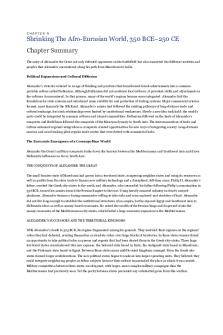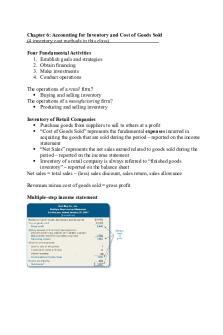Sociological school - Lecture notes 6 PDF

| Title | Sociological school - Lecture notes 6 |
|---|---|
| Author | Pranav Sharma |
| Course | Jurisprudence |
| Institution | Panjab University |
| Pages | 15 |
| File Size | 206.4 KB |
| File Type | |
| Total Downloads | 93 |
| Total Views | 131 |
Summary
Lecture NOtes...
Description
SOCIOLOGICAL SCHOOL Until recently, it has been possible to divide jurists into three principal groups, according to their views of the nature of law and of the standpoint from which the science of law should be approached. We may call these groups the Philosophical School(natural law), the Historical School, and the Analytical school. However, now there is a marked tendency to abandon the exclusive use method, and to bring these formerly divergent schools together. Sociological approach to the study of law is of the recent origin. While other schools concentrated more upon the nature of law and its sources, the jurists who belong to Sociological school lay emphasis upon the actual working and functioning of the law and the social ends which it seeks to subserve. Sociological approach towards study of law was a reaction and revolt against the analytical and historical school both of which regarded law as self contained system – the former deriving validity of law from the sovereign, the law giver and the latter from the slow and silently flowing historical and cultural processes and forces. Thus, the jurists who define law in relation to the society and consider law as an instrument of social change are said to belong to Sociological school. BACKGROUND 1. Sociological approach to the study of law was a reaction against the formal and abstarct approach of the analytical jurists and the pessimistic approach of the historical jurists. There was a dire need to study law not in mere abstraction and isolation, but in its functional and practical aspects. 2. credit for the emergence of this School of thought also goes to the doctrine of “Laissez – Faire” which implies the policy of minimum governmental interference in the economic affairs of individuals and society. This idea of capitalism only allowed the Government to interfere during any conflicts or during any situation where an individual was forced against his/her will and not in any other circumstance The Sociological school came out as a reaction against the laissez-faire because sociological school advocates the balance between the welfare of the state and individual interest. This led the States to expand the dimension of their activities to such matters as health, insurance, education, old age security and other form of social and economic aspects of welfare. Hence a new approach
towards the study of law in relation to its ends, purposes and functions for ordering and regulating relationship between individuals and groups of individuals emerged. Features 1. Sociological School of Jurisprudence is a school of thought that firmly believes that law and society are interlinked and the law impacts the society at large. If there is a change in the society then that will directly or indirectly affect the law or the legal system and vice versa. 2. law must be studied in action and not in textbooks. 3. Sociological jurists insist on the unity of the social sciences and the impossibility of the wholly detached, self centered, self sufficing science of law. 4. It considers law as a social institution which can be consciously made and also changed, modified or retained on the basis of experience. In other words, it synthesizes both the analytical and historical approach to the study of law. 5. Sociological Jurists lay emphasis upon social purposes and social goals and expectations which the law subserves rather than upon sanctions and coercive character of law. 6. The fundamental tenet of this school according to Paton is that we cannot understand what a thing is unless we study what it does. 7. According to Roscoe Pound the significant feature of sociological jurisprudence is that it lays more emphasis on functional aspect of legal institutions, principles and precepts and regards law as an instrument or technique of sub serving of individual and social interests. Exponents of sociological school 1. Rudolf Von Ihering (Social Interest) He was a German jurist and is known as the ‘father of Modern Sociological Jurisprudence’. Ihering was educated at Berlin in Germany. He was professor at Basel. His “spirit of law” was published in four volumes during 1852-1865. later, he published his principle work which was translated as ‘Law As Means To An End ‘in 1913. He developed a philosophy of social utilitarianism and combines it with Austinian positivism. In emphasizing the needs of society, he differed from the individualist approach of the English utilitarian philosopher Jeremy Bentham.
He rejected the view of the Historical school. According to him, the origin of law is neither spontaneous nor peaceful. “It is the result of constant struggle or conflict with a view to attaining peace and order”. Ihering says, “Law is the guarantee of the condition of life of society assured by the State’s power of constraint”. Ihering laid the foundation of modern sociological jurisprudence by this insistence on treating law as one of the important factors to control the social organism .According to him i)Law has a coercive character ; ii)it has only a relative value; and iii)it has to be evaluated in the social context . Thus he treated law as an effective instrument for the attainment of social purpose. The main Elements of Ihering’s theory 1. Law is to serve ‘Social Purpose’: He takes law as a means to an end. “Law, Ihering said, is not the highest thing in the world, not an end in itself, but it is merely a means to an end, the final end being the existence of society.” Ihering's fundamental philosophy is based upon a theory of psychological causation. The physical world was entirely subject to the laws of cause and effect. In the animal world some actions were wholly automatic and involuntary. A human being in the discharge of his natural functions was subject to the same law as the animal kingdom but the operations of his mind were not involuntary. On the contrary, they were always guided by some concept of purpose. “Interest is an indispensable condition of every action, and purpose is the creator of the entire law. Since human life and social life are synonymous, the entire scheme of the law may be stated in the proposition: 'I exist for myself, the world exists for me, I exist for the world.” The end of law is to serve purpose. This purpose is not individual but social purpose. When individual purpose comes in conflict with social purpose, the duty of the state is to protect and further social purpose and to adjust selfish with unselfish purposes and to suppress the former when they clash with the latter. Ihering stressed that law does not exist for the individual as an
end in himself, but serves his interest while taking into consideration the good of society. If the society is happy, so will be the individual. 2. The Balancing of conflicting interests: Ihering stressed on balancing between various interests. He said that social interest must be given priority over individual interest. He grouped interests into 3 categories: · Individual interest e.g. Fundamental Rights. · State Interest e.g. Fundamental Duties. · Social Interest e.g. Directive Principles of State Policy (DPSP). 3. The Principles for ‘Social Control’ used by the ‘State’: The social activities of man need to be encouraged. Man was an egoist but he was capable of altruism. The levers which society employed to overcome his egoism were reward and coercion. The social purpose, according to Ihering, may be achieved by the ‘principle of coercion’. Ihering said that the use of coercion by the state was justified to protect social interest. 4. Law is not the only means to control social organism: It should not be assumed that law is the only means to control the social organism, or it alone can protect and advance all the social purposes. Law is the only one factor among many others. There are some conditions of social life, such as climate, etc. for which no intervention is made by law. There are some others where only part-intervention is made by Law. Lastly, there are some conditions of social life which are secured exclusively by law, such as the raising of revenue. Like Bentham, Ihering also defines ‘Interest’ in terms of pleasure and pain, that is pursuit of pleasure and avoidance of pain may be called as’ Interest’. It is mainly for this reason that Ihering’s theory has been called as “Social Utilitarianism”. He considers punishment as a means to a social end. Ihering’s Contribution to the science of Jurisprudence has been acknowledged by Friedman who calls him the ‘father of modern Sociological jurisprudence’. Ihering traced the development of various legal systems by adopting comparative method of study and came to the conclusion that
law develop by conscious efforts .He was a critic of savigny’s historical theory and natural law theories propounded by his predecessors. While Ihering was not the primary influence in the field of modern criminology, his ideas were in harmony with its emphasis upon the criminal rather than his crime, and he undoubtedly helped to create the criminological school of Franz Liszt, the representative of positivism in Germany. He inspired even the Marxists, who made use of the jurisprudence of interests to contend that the function of law was to give effect to class interests. Indeed the fundamental difficulty of Ihering's philosophy is precisely that it provides no objective criteria for determining the purpose which the law is to serve, and for selecting the interests which the law is to protect. Law was undoubtedly a means to an end but what end? Who was to determine the end? The individual, the society, the personal ruler, the abstract state? When one end is assumed, is only a particular means to be allowed? These questions have largely remained unanswered. In this aspect, his theory seems to be directionless. Ha has also overemphasized the importance of sanctions or coercion. In fact, coercion is not the only means to induce obedience. 2. Leon Duguit (Social Solidarity) Leon Duguit was another great jurist of sociological jurisprudence. He was professor of Constitutional Law at the University of Bordeaux. He belonged to the age of the collectivist legislation. He developed the theory of social solidarity at a period when the doctrine of individualism was crumbling in Europe being replaced by a new philosophy of collectivism. He was greatly influenced by the Auguste Comte and Durkheim. He gave the theory of Social Solidarity which explain the social cooperation between individuals for their need and existence. Basic postulates of Duguit’s legal theory: 1. Social solidarity: The term ‘Social Solidarity represents the strength, cohesiveness, collective consciousness and viability of the society.’ Leon Duguit’s Social Solidarity explains the interdependence of men on his other fellow men. No one can survive without the depending on other men. Hence the social interdependence and cooperation are very important for human existence. The objective of the law is to promote Social solidarity between individuals. And
Leon Duguit considered that law as bad law which does not promote social solidarity. Further, he also said that every man had the right and duty to promote social solidarity. Men have common needs they also have dissimilar needs that cannot be fulfilled without mutual adjustment and accommodation. No one can satisfy his needs and can live in present day world without depending on the services provided by the others. In the present day society, man exists by his membership of the society. Each man cannot manufacture and procure the necessities of life himself. The end of all human activities and organization should be to ensure the interdependence of men. Law also is to serve this end. Duguit says ‘Law is a rule which men possess not by virtue of any higher principle whatever (good, interest or happiness) but by virtue and perforce of facts, because they live in society and can live in society.’ Duguit was also influenced by Emile Durkheim’s work ‘Division of Labour in Society’ (1893). Duguit made a distinction between two kinds of needs of men in society. Firstly, there are common needs of individuals which are satisfied by mutual assistance. Secondly, there are diverse needs of individuals which are satisfied by the exchange of services. Therefore, the division of labour is the most important fact of social cohesion. He named it ‘social solidarity’. This ‘social solidarity’ is a fact and it is necessary for social life. In the word of Duguit, “Man must so act that he does nothing which may injure social solidarity upon which he depends and more positively, he must do all which naturally tends to promote social solidarity. The social solidarity gets converted into a normative principle under Duguit's rule of law. As a consequence no statue or administrative order is valid which is not in consonance with the principle of social solidarity and social interdependence. Duguit maintained that when the state ceases to further the cause of social solidarity there is duty to revolt against it. 2. State sovereignty is a myth : Duguit criticized the traditional notions of state sovereignty. To Duguit a state is not a person distinct from individuals. Duguit was in favor of a strong check on the abuse of state power through the principles of establishment of strict principles of state responsibility. He sought to strip the state and its organs of all sovereign rights and other attributes of sovereignty with which the traditional doctrine of public law had bestowed upon it. Law must limit a state. Duguit says that a rule becomes law even before it is recognized by state
provided it has behind it the effective support of the community. A state cannot claim any special position or privilege. It is not a mystical entity but an organization of men that can only be justified so far it furthers social solidarity. Duguit’s theory of minimization of state function leads him to deny any arbitrary power to legislator. Legislator does not create law but merely gives expression to judicial norm formed by the consciousness of the social group. 3. There is no such thing as rights: Duguit was influenced by August Comte, the noted French positivist who had expounded law as a fact and had rejected the theory of subjective rights. Comte’s notion that ‘the only right which man can possess is the right always to do his duty’ greatly influenced Duguit’s theory. Despite his emphasis on social duties, Duguit rejected any absolutist conception of state power. On the whole, Duguit seems to be confused. He, so vehemently criticized natural law school, but he himself set a standard to which all positive law must conform and whose authority is uncontestable and that is social solidarity. That is why it is said that ‘Duguit pushed natural law out through the door and let it come by window’. While defining law, Duguit is confused between “is” and “what the law ought to be”, as according to him, if the law does not promote social solidarity, it is not a good law at all. Some scholars were apprehensive that as Duguit has not specified as to who will decide whether a particular law promotes social solidarity or not. Naturally, it would be left to the judiciary to so decide and consequently, social solidarity may become a question of personal evaluation and it may also lead to judicial despotism. 3. Eugen Ehrlich (Living Law) Eugen Ehrlich was an Austrian legal scholar and sociologist of law. He is widely regarded as one of the primary founders of the modern field of sociology of law. He is known for his thory of ‘Living Law’. “The living law is the law which dominates life itself even though it has not been posited in legal propositions. The source of our knowledge of this law is, first, the modern legal
document; secondly, direct observation of life, of commerce, of customs and usages and of all associations, not only those that the law has recognised but also of those that it has overlooked and passed by, indeed even of those that it has disapproved.” The first part of Ehrlich’s definition implies that law "cannot be imprisoned in a code." We need to go "beyond" the law books so as to take into account both the role of society in generating state law and judicial sentences, and the way it shapes laws and decisions. Ehrlich claims that “the centre of gravity of legal development lies not in legislation, nor in juristic science, nor in judicial decision, but in society itself”. Ehrlich noted that legal theories that recognized law only as a sum of statutes and court decisions gave an inadequate view of the legal reality of a community. He drew a distinction between norms for decision and social norms or norms of conduct. The latter actually govern the life of a society and, under certain conditions, can justifiably be regarded in popular consciousness as law. For example, commercial usage and custom may develop and be recognized and respected by courts of law and other agencies as having normative force and legal significance. Ehrlich claimed that the “living law” that regulates social life may be very different from the norms applied by courts. Norms for decision regulate only those disputes that are brought before a judicial or other tribunal. Living law is a framework for the routine structuring of social relationships. Its essence is not dispute and litigation, but peace and co-operation. Ehrlich's teaching is that the sources of law's authority are plural and insofar as some of those sources are political and others cultural, they may conflict. By facts of the law, he understands certain primary basic phenomena of social life which form the immediate basis of the legal order in human society. “The whole economic and social order of the human race is based upon the following small number of facts: usage, domination, possession, disposition (usually by contract or by testamentary disposition).These facts of the law are social structures to be found wherever human beings are living together. The facts of the law exist before any positive law arises, even before any social order consisting of general rules of conduct comes into existence. Thus: “possession precedes ownership and there were contracts before there was a law of contracts."
One must take a long step behind the codes of law to reach “the basic form” of the law; a legal order which is not mere doctrine, dogma or theory, but “dominates life itself even though it has not been posited in legal propositions,” and this is what he calls the living law. Ehrlich makes a clear distinction between state law and juristic law. In his opinion state law in the proper sense of the word is to be found only where the particular rule has been created by the state. The part played by the state in the creation of law is generally much overrated; it is in truth a very limited one. The bulk of rules of state law consists primarily of norms concerning the organization of public authority, and of legal commands directed to courts and administrative bodies. When the state goes beyond this field of legal operation, as a rule it borrows the contents of its legal provisions from juristic law as it has been developed by legal writers, lawyers and judges. Ehrlich's theory is open to question on just this point. Does the so-called living law deserve the name of law in its proper sense? What guaranties the legal character of the facts of the law and distinguishes them from other, non-legal facts of social life? The continuous usage within a particular group of human beings may be lawful or unlawful or may be neither. The mere fact of usage can never serve as a criterion for the question whether the norms according to which the members of the group act possess the quality of legal norms. Ehrlich criticizes at great length the theory of "customary law" as developed by Savigny, Puchta and their followers during the nineteenth century. But he himself while avoiding this term develops in his theory of the living law a customary law on so large a scale that the posited law plays a very subordinate role. 4. Roscoe Pound (Social Engineering) Roscoe Pound was an American legal scholar and educator. He served as Dean of the University of Nebraska College of Law from 1903 to 1911 and Dean of Harvard Law School from 1916 to 1936. He wrote “Spurious Interpretation" in 1...
Similar Free PDFs

Historical school - Lecture notes 3
- 12 Pages

Lecture notes, lecture 6
- 3 Pages

Ch 6 - Lecture notes 6
- 3 Pages

Chapter 6 - Lecture notes 6
- 5 Pages

Module 6 - Lecture notes 6
- 2 Pages

Chapter 6 - Lecture notes 6
- 6 Pages

Chapter 6 - Lecture notes 6
- 9 Pages

Anth101 6 - Lecture notes 6
- 4 Pages

Chapitre 6 - Lecture notes 6
- 2 Pages
Popular Institutions
- Tinajero National High School - Annex
- Politeknik Caltex Riau
- Yokohama City University
- SGT University
- University of Al-Qadisiyah
- Divine Word College of Vigan
- Techniek College Rotterdam
- Universidade de Santiago
- Universiti Teknologi MARA Cawangan Johor Kampus Pasir Gudang
- Poltekkes Kemenkes Yogyakarta
- Baguio City National High School
- Colegio san marcos
- preparatoria uno
- Centro de Bachillerato Tecnológico Industrial y de Servicios No. 107
- Dalian Maritime University
- Quang Trung Secondary School
- Colegio Tecnológico en Informática
- Corporación Regional de Educación Superior
- Grupo CEDVA
- Dar Al Uloom University
- Centro de Estudios Preuniversitarios de la Universidad Nacional de Ingeniería
- 上智大学
- Aakash International School, Nuna Majara
- San Felipe Neri Catholic School
- Kang Chiao International School - New Taipei City
- Misamis Occidental National High School
- Institución Educativa Escuela Normal Juan Ladrilleros
- Kolehiyo ng Pantukan
- Batanes State College
- Instituto Continental
- Sekolah Menengah Kejuruan Kesehatan Kaltara (Tarakan)
- Colegio de La Inmaculada Concepcion - Cebu






